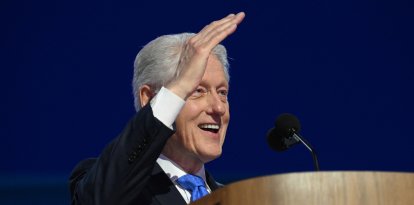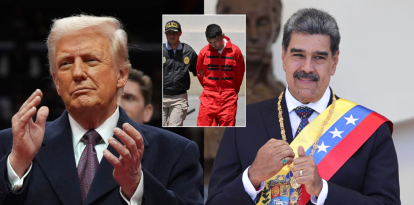This journalist is just 14 years old and has already interviewed Justin Trudeau: Wyatt Sharpe's story
The young man spoke exclusively with Voz Media and revealed how he fell in love with journalism, the behind-the-scenes look at his day-to-day and who would be his ideal interviewee.

The Wyatt Sharpe Show
At 14, teenagers are on their way to high school. They spend their time studying, playing sports, building lasting friendships, and starting to prepare for college life. Or at least, that's what most adolescents do at that age. But that's just not the case with Wyatt Sharpe.
This Canadian boy has something different in mind. He gets up early every day to record his program, which is broadcast on YouTube, goes to school and then rubs shoulders with the most important political and business figures in the United States and Canada.
For example, he has already managed to interview Justin Trudeau (Prime Minister of Canada), other political figures such as Asa Hutchinson, Larry Elder, Scott Walker, Kari Lake and John Bolton, as well as members of Congress, Eric Swalwell, Ro Khanna, Jamal Boowman and Nancy Mace. In addition, he spoke with Steve Wozniak (co-founder of Apple).
In an interview with Voz Media, Sharpe talked about his beginnings in journalism, how he manages the agenda of a professional at 14, and his future plans.
The start of a young career
Wyatt started dabbling in journalism at 11, he says, because of his innate curiosity about the world. This was enhanced during the Coronavirus, when politicians, scientists and analysts constantly paraded through the media. He felt the need to interrogate them.
"I really liked the idea that you could ask them questions and almost be a representative of the people, interrogate these people on behalf of your viewers and on behalf of the voters," he explained.

Always focused on politics above other subjects, he exchanged emails with candidates and protagonists of the political arena until he decided to try virtual interviews and upload them to social networks.
The young journalist understood that, beyond just exposure, he could provide a service. That led him to start
"The Wyatt Sharpe Show."
"I think helping to inform people is the main goal of journalism, anchors and news personalities. They both like to do it themselves, they like to talk to people, but they also realize that they can help benefit others because often the information that is provided is important and relevant to the current issues that are impacting the news cycle. So I think I realized it would be beneficial and decided to do it," he continued.
As a general rule on his program and in his interviews, this 14-year-old journalist believes that the most important thing is to ask questions that bring answers capable of "benefiting" people, capable of contributing something to viewers that they did not have before listening or watching the program.
The interview with Justin Trudeau
Interviewing one-on-one with the political leader of a country is definitely not for everyone. Some professionals may never get that opportunity in their career, and Sharpe had already done it at age 13.
He spoke to Justin Trudeau in 2021, and it didn't take long for his talk to go viral. How did he land that interview? It's a story of resilience. "I contacted his team, as I did with all the other Canadian Party leaders at the beginning of the campaign, and they said they were going to try to make something work, but I didn't get much response," he revealed.
The months went by until, just three days before the end of the campaign, he decided to pressure the prime minister's press team. "I think it was about three days before Election Day when I contacted his campaign team again and asked them if they had any news, and they confirmed a time for the next day for a virtual interview," he added.
Without much time to prepare, he brought his previous knowledge of Canadian politics and, without getting anxious, decided to start the interview by asking the prime minister for an economic analysis of the past and future of the pandemic. Specifically, he asked Trudeau how he would reduce the fiscal deficit without raising taxes.
Did you ever feel underestimated?
As any major political personality, as is the case with those Sharpe has interviewed, they may perceive an interview with a 14-year-old boy as calmer and more relaxed, and in which they will not have to answer racy questions.
Although the young journalist is well aware that this may be the perception of some interviewees, he makes sure that the interviewee feels the rigor of his journalism in each interview.
"Some people assume that, by definition, you know, maybe there will be people who come to my show and they don't necessarily think it's going to be a normal interview that they'd have with any other news personality, maybe they expect it to be an easier interview, so I like to prepare my questions, ask them relevant, impactful questions and make sure the questions I ask are objective," he said.
Ideal interviewee
In this arena, Sharpe does not have any doubts. If he had to handpick one person to interview tomorrow, it would be Hillary Clinton. "She's someone who broke a lot of barriers, she was the first woman to lead a major party, whether it's the Democratic or the Republican, for the presidency, and regardless of what you think of her political ideals, she's still someone who has had a huge impact on politics."
What would you ask in a potential interview? Sharpe wants to take her back to the night of November 8, 2016, to find out when she realized there was a serious possibility of losing the election to Donald Trump.
School and a career at age 14
Sharpe gets up early every morning for his morning show and then goes to school as a 14-year-old. He lives with his parents, enjoys playing baseball and going to the family's cottage.
Being part of the current crop of platform and social media journalists, he can adjust his calendar to his day-to-day needs. In that delicate balance between the life of a 14-year-old boy and that of a journalist, Sharpe has his focus well-defined.
"It's not only what's important in life, but also the things I enjoy doing. And I like to do this, so I'm able to combine the two things together. When you like to do something, it's much easier to balance it."

























